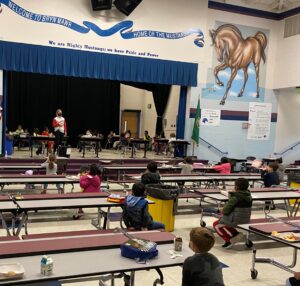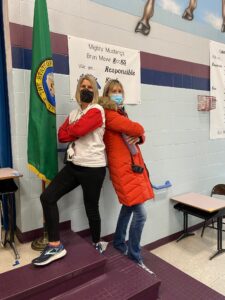We all have distant memories of a loud, chaotic lunchroom, where students often had their heads down for being too loud and left lunch a bit dysregulated and less ready to learn. At Bryn Mawr Elementary, the staff has creatively addressed one of the key sources of stress for all schools this year – how to manage the lunchroom in the wake of a pandemic.

Hopes for the lunchroom
They wanted to create opportunities for students to learn and be part of community throughout the day, and that included lunch time. The classified staff met in August to think about the lunchroom, past practice, the current purpose, and their hopes for what eating lunch would feel like for students.
Designing and implementing new systems
The adults knew they wanted lunch to be a chance for students to practice social emotional skills and be in community while they ate. With this mindset, the question was – what systems, routines, and practices do we need to put in place? The team collaboratively decided to implement new systems. They:
- shortened the route students took to come in from the playground to the cafeteria
- established a consistent ABC line order
- made a safety routine for clean hands, making sure all students “gel in and gel out”
- made a commitment to no longer have silent lunch
- added additional adult support to serve lunch and sanitize after each group
The classified staff along with teachers taught and practiced expectations with all students the first few days.

Creating routines for safety and socialization
Ralitsa Sergieva supervises 2nd-5th grade lunch. She said, “It’s kind of a happy accident that having the students spaced farther apart (6ft safety requirement) really helps. Students have privacy and can still connect and be social with friends.” Staff also created a routine to help students remember to put masks on when they throw away their garbage. Tiffani Ottoboni, who supervises K-1 lunches, says, “Creating a routine and practicing ‘If you stand up, mask up’ helped the youngest students stay safe and be responsible.”
Being intentional about connection and community
They also brought in some experience they gained during online learning – the intentional focus on connection and community. “Lunch Bunch,” a popular social session during online school last year, created the opportunity for group engagement and fun. In the lunchroom now, supervisors connect with the kids and ask questions using a conversational, calm tone. They play fun games like Would You Rather, sometimes led by students, and use student interests to create new ways to have safe fun. They are even thinking about bringing in music or trivia games in the future.
Success and challenges
Just two weeks into this school year the team was pleased to report that the lunchroom had become a celebration. Students come in safely, get settled quickly, and enjoy the chance to talk quietly with the people who were closest to them.
But some challenges persisted. They still struggled with timing and getting everyone “trashed out” in time to get the tables clean before the next group arrived. The team reflected and decided to adjust times, improve recess and lunchroom staff communication, and check in with teachers.
It doesn’t need to be perfect to make a difference
After just a month of school, adults and students are feeling the difference. Ralitsa says, “Lunch is a million times better – it is clean, more manageable, and fun. I wasn’t sure it would work, but it is K-5! It is helpful because we all work like a family. All the adults are on the same page.” Tiffani says, “I feel so much better. I enjoy the chance to connect with kids and I’m noticing that I have more space to think and be creative about what’s possible in this new lunchroom environment.”
The lunchroom doesn’t need to be perfect, but the process of reflecting and adjusting as a team and including student voice is making a difference.
We are inspired by the thoughtful and intentional effort the Bryn Mawr Elementary community continues to put into making lunch a safe and engaging learning opportunity.
Stacy Lappin is the Director of Program at Sound Discipline.
